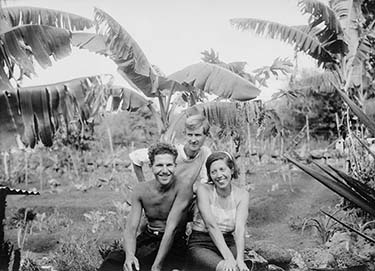FAYETTEVILLE, Ark. – One important responsibility of a science educator is to attract interest in science teaching and learning. University of Arkansas professor William F. McComas has recently developed some ammunition in this quest – he can describe his involvement in the making of a documentary film about a story of survival and mysterious death and disappearance all set against the backdrop of the Galapagos Islands.
The Galapagos Affair: Satan Came to Eden will be screened from 6 to 8:30 p.m. Sunday, April 26, at the Arkansas Union Theater on the U of A campus. The event includes a question-and-answer session with the Emmy-winning filmmakers Dayna Goldfine and Dan Geller, who will be introduced by McComas.
The screening is free and open to the public with no tickets required but seating is limited. The showing is presented by the Parks Family Professorship of Science Education, the College of Education and Health Professions and the Walter J. Lemke Department of Journalism.
McComas, the Parks Family Professor of Science Education, discovered a trove of archival photographs and dusty reels of 16 mm film shot on the islands nearly 70 years ago. The collection had its own backstory that McComas will share at the screening. He approached The Discovery Channel, PBS and National Geographic with an idea to make a film using the archived images, but when introduced through a mutual acquaintance to Geller and Goldfine he knew the project had found a home.
“Dan and Dayna are extraordinarily gifted filmmakers with their own special creative vision,” McComas said. “Just look at their projects such as Ballets Russes, which met with critical acclaim both at the Sundance festival and in general release, and Something Ventured about the venture capital industry.”
The New York Times called the film “a darkly amusing historical documentary about the fruitless search for paradise on Earth by vainglorious, world-weary dreamers who set themselves above, and apart from, the rest of humanity.” The review described the movie as a hybrid of juicy period soap opera and Survivor, set on the dismal island of Floreana, the southernmost speck on the Galapagos archipelago.
More about the film is available on its website. According to the website, a Berlin doctor and his mistress fled conventional society of the 1930s to start a new life on the uninhabited Floreana Island. They were soon followed by others, including an Austrian baroness and her two lovers. When some of the islanders disappeared, suspicions of murder hung in the air, leaving an unsolved mystery that remains the subject of local lore today.
“There is a fascinating parallel between natural selection and the human drama in The Galapagos Affair,” McComas said.
McComas is a nationally acclaimed evolution educator who has written a variety of articles on the subject and has visited the Galapagos many times. This chain of volcanic islands in the Pacific Ocean contributed significantly to Charles Darwin’s theory of evolution by national selection and now serves as a living laboratory of natural history and evolution in action.
“I have long had a professional interest in the Galapagos because of their impact on biology and evolution education, but about 15 years ago I became aware of an amazing human story tied to the islands,” McComas said. “Professors have a compelling opportunity to follow leads and see what develops, but I never expected to become part of a theatrical film project with such incredible documentary filmmakers. Even though this project is more sociology and murder mystery than science education, there is a good chance that folks will learn more about biology and about evolution while being attracted to the engaging story this movie tells.
“There are competing notions about what happened on the island, but I don’t think we will ever know the entire story,” McComas continued. “That works to the advantage of the film. In addition, the tale told in the movie has grown. It gives a better view of the Galapagos Islands in the days before tourism. There is also the potential for audience members to consider a survival-of-the-fittest backstory. It is possible to look at the characters and imagine who you would pick to survive and why.”
McComas was invited to travel to Floreana Island with Geller and Goldfine and their team as they shot high-definition nature footage of the islands for use in the documentary.
“We got some incredible natural history shots to help frame the extraordinary human saga told in The Galapagos Affair,” he said.
At the U of A, McComas teaches The Darwin Course, an honors symposium focusing on the life of Darwin and the far-reaching implications of his contributions to evolutionary biology.
About the University of Arkansas: The University of Arkansas provides an internationally competitive education for undergraduate and graduate students in more than 200 academic programs. The university contributes new knowledge, economic development, basic and applied research, and creative activity while also providing service to academic and professional disciplines. The Carnegie Foundation classifies the University of Arkansas among only 2 percent of universities in America that have the highest level of research activity. U.S. News & World Report ranks the University of Arkansas among its top American public research universities. Founded in 1871, the University of Arkansas comprises 10 colleges and schools and maintains a low student-to-faculty ratio that promotes personal attention and close mentoring.
Contacts
William F. McComas, Parks Family Professor of Science Education
College of Education and Health Professions
479-575-7525, mccomas@uark.edu
Heidi Wells, director of communications
College of Education and Health Professions
479-575-3138, heidisw@uark.edu
